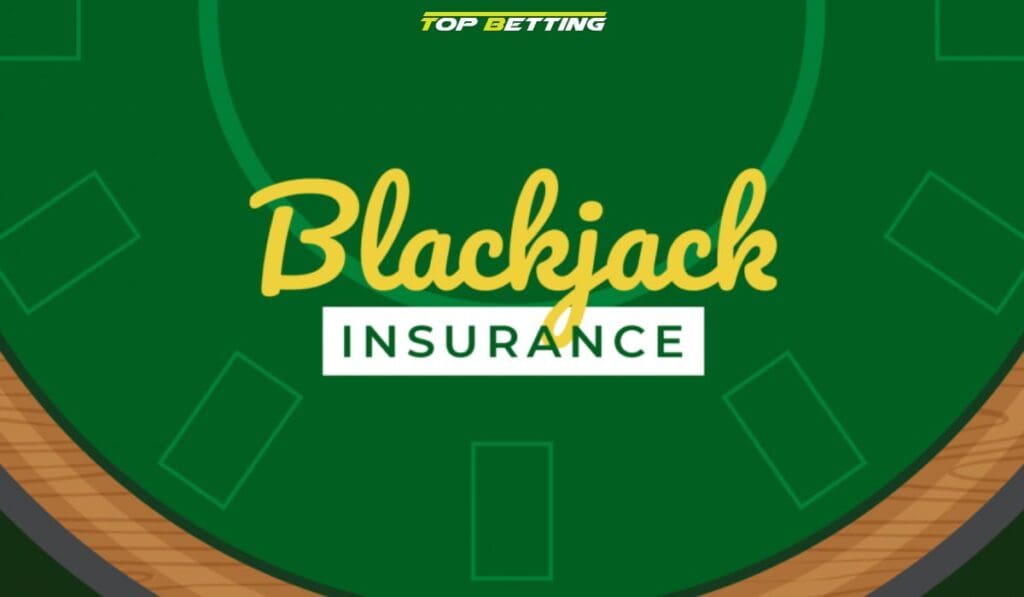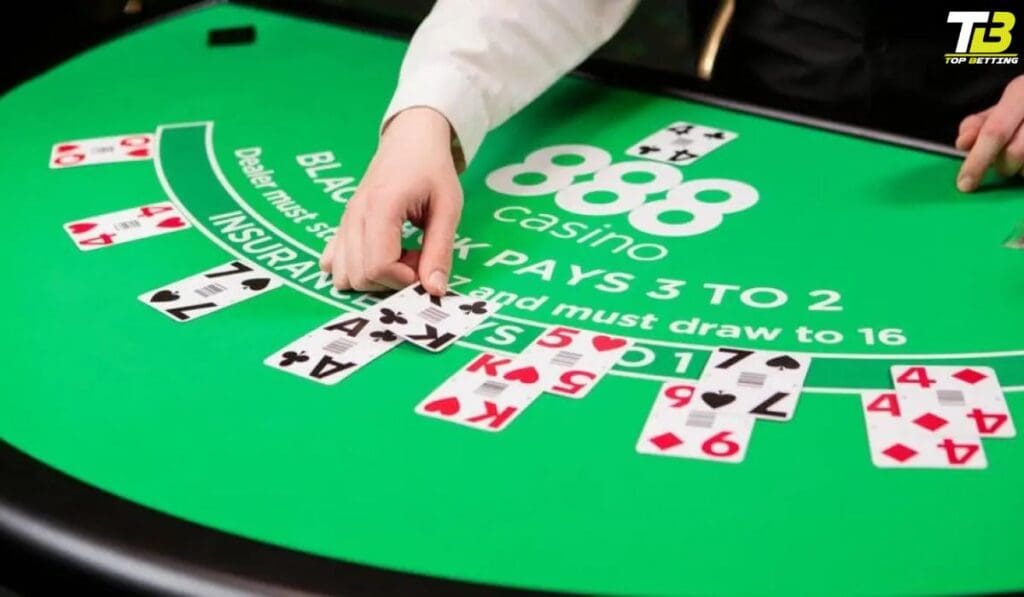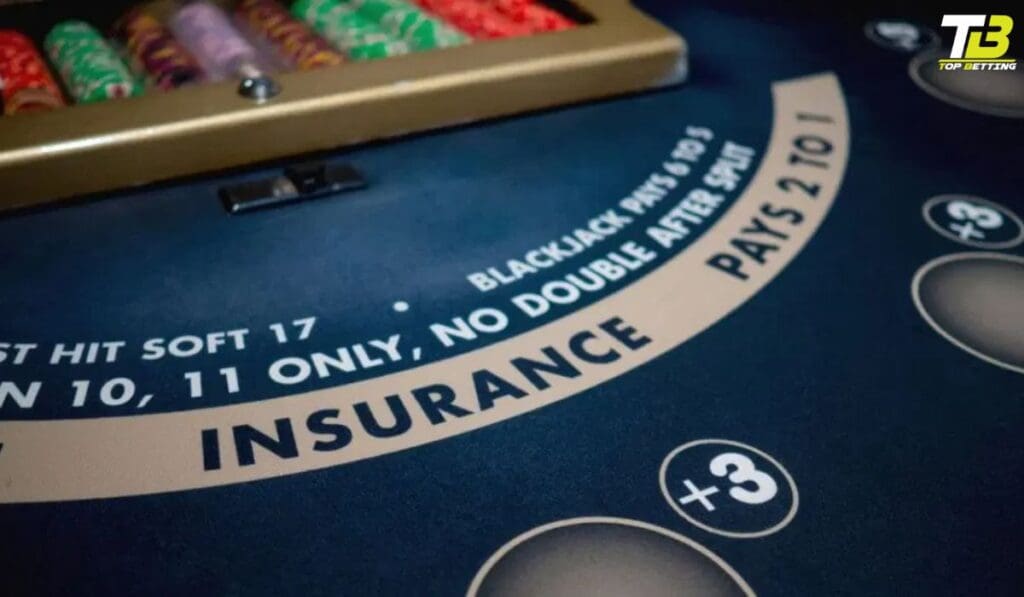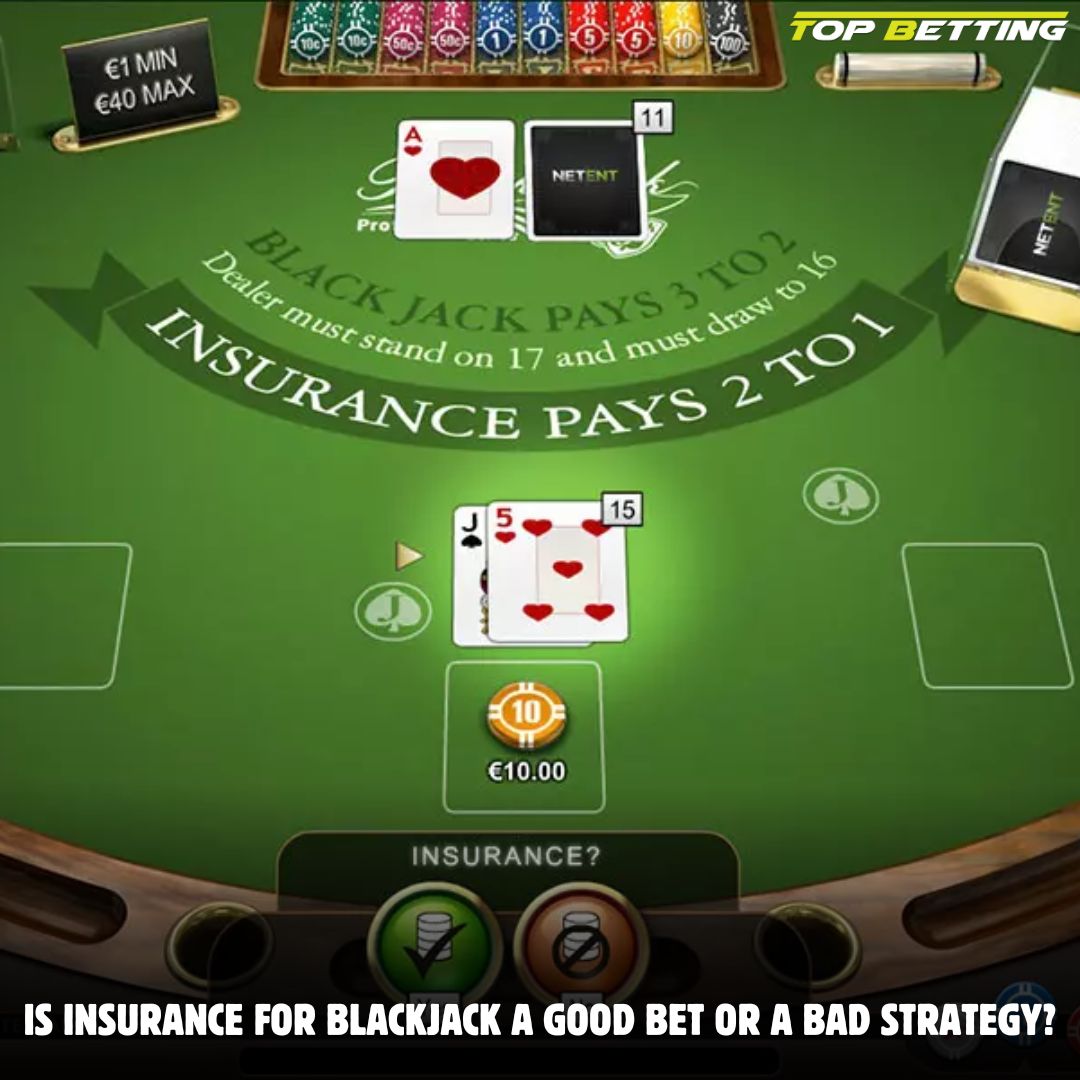
Is Insurance for Blackjack a Good Bet or Bad | The Truth
There aren’t many rules to blackjack; the object of the game is to wager against the dealer and avoid scoring more than or less than 21. And that’s it. That is, until casinos made the decision to add side bets and a (unnecessary) puzzle to the gameplay. One such conundrum is blackjack insurance.
We’ve already given you a hint as to why this is a bad play, but stick with us to find out more about blackjack insurance, why you should almost always avoid it, and what the odds are.
What Does Blackjack Insurance Mean?
To begin, let us address the most fundamental query: What does insurance mean in blackjack?
The most popular optional side bet in blackjack is blackjack insurance, which allows you to protect yourself from the dealer’s blackjack when they hold an ace as the upcard.
In essence, you are wagering that the dealer will deal a ten or a picture card as their second card, resulting in a total of 21 when you place the insurance bet. If the dealer hits a blackjack and pays you at 2:1 odds, you win.
Strategies for using blackjack insurance effectively
While the odds may not be in your favor when it comes to blackjack insurance, there are some strategies you can employ to minimize your losses and maximize your chances of winning. Here are a few tips to keep in mind if you decide to use blackjack insurance:
Only take insurance when counting cards: If you are an experienced card counter, you may be able to gain some advantage by taking insurance in certain situations. By keeping track of the cards that have been dealt, you can have a better idea of the likelihood of the dealer having a blackjack. However, it’s important to note that card counting is not allowed in all casinos, so be sure to familiarize yourself with the rules before attempting this strategy.
Set a limit: Before you start playing, set a limit for how much you are willing to spend on insurance bets. By establishing a budget, you can avoid getting caught up in the moment and making impulsive decisions. Stick to your limit, even if you feel tempted to take insurance.
Focus on basic strategy: The best way to improve your odds in blackjack is to master basic strategy. By understanding the optimal play for every possible hand combination, you can minimize the house edge and make more informed decisions at the table. Basic strategy is based on mathematical calculations and takes into account factors such as the dealer’s up card and your own hand value.
You forfeit your insurance bet if their card is not a ten-value card.
What Are the Odds and the Math Behind Blackjack Insurance?
Let’s examine the mathematical basis of the insurance blackjack bet so you can make a more knowledgeable decision.
The ratio of ten-value cards to non-tens in an online blackjack game with a single deck and a $2 insurance bet is 16 (four tens, four jacks, four queens, and four kings) to 36.
Assume for the moment that the dealer asks if you would like to place the insurance bet while holding an ace as the upcard. If we ignore the makeup of your hand, the ratio of non-ten-value cards to ten-value cards is now 35 to 16. Stated differently:
You lose $70 (the total number of times the dealer doesn’t have a ten-value card) if you make the $2 insurance wager 35 times.
If you place the identical stake 16 times and the dealer has a ten in the hole, you will win $64 (assumed payout of 2:1).
You would have a $6 net loss if you always chose insurance (you would have lost $70 against $64 in wins). The house edge, or 5.9%, is what we obtain when we divide the $6 in profits by the $102 investment to determine the disadvantage.
The payback odds for blackjack insurance, as you can see, are not as high as the actual odds of getting a ten-value card; if they were, the house would win slightly more than $4 for each correct wager. However, it doesn’t, which indicates that the odds are stacked in favor of the casino.
Is Your Hand Covered by Insurance?
The insurance bet is not specifically discouraged by blackjack regulations. But if any of the following scenarios sound familiar to you, use basic algebra and common sense to figure out what to do next:
If Your Hand Is Low
If your hand is low, like 16 or lower, you might think about getting insurance. You will probably bust if you draw another card, in which case the insurance wager can partially offset your losses.

If Your Hand Is Good
Assume the dealer holds an ace and you have a twenty. Some players might suggest insurance because it will be difficult for the dealer to beat your 20 even if they don’t pull a 10 in the hole. You won’t lose a wager on a strong hand either.
The dealer’s chances of getting a ten in the hole are decreased if you have a 20, though, because two of the eight ten-value cards are already in play. The house edge rises to an incredible 14.5% in such circumstances, making a good hand the worst time to think about hand insurance.
If You Hold an Even Money Blackjack Hand
You are in “even money” territory (almost identical to an insurance bet) if you have a blackjack and the dealer lands an ace.
Assuming the dealer lands a blackjack and you staked $10 on a $5 insurance risk, you will profit $10 on the 2-1 payout. If the dealer fails, you lose your $5 insurance wager but receive $15 on the 3-2 payment, for a net gain of $10.
In order for this to be correct, the dealer must not take out a 10-value card; in less than 31% of cases, the dealer will receive the correct card. You stand to gain $15 on your initial $10 bet if they don’t tie your blackjack. You can see that the chances are stacked against you in this scenario, so there’s really no reason to risk those $5.
To be successful at this, you need to be much more skilled at blackjack card counting than just a simple technique, hence we would suggest against it.
Additional Blackjack Side Bet Types
In blackjack, there are other bets than the primary one that determines whether your hand will beat the dealer’s. These other types of side bets are riskier because they have bigger house edges and, on average, pay out more than a blackjack basic wager.
In addition to insurance, the following are some of the most well-liked blackjack side bets:
You can bet on perfect pairs, colored pairings, or mixed pairs, depending on whether you think the player’s opening two cards will make a pair or not. A perfect pair consists of the first two cards in the deck that are the same rank and suit; a coloured pair consists of the same rank and suit but distinct suits; and a mixed pair consists of the same rank cards that are in various suits. Payouts for this side bet often fall between 6:1 and 30:1.
21+3 is a three-card poker hand that you can make by combining your first two cards with the dealer’s upcard. The winnings for this hand depend on how strong it is (flush, straight, three of a kind, etc.). The payouts for 21+3 differ between casinos.
Brust It involves placing bets with different payouts on whether the dealer will bust and, if so, how many cards it will take.
The Lucky Ladies side bet entails wagering on the player’s first two cards adding up to 20. The payoff increases with the total; two Queen of Hearts totaling 20 usually earn the largest payout.
Predicting whether the total of your first two cards will be above or under 13 is the goal of above/Under 13, with prizes often being even money.

Common misconceptions about blackjack insurance
There are several common misconceptions surrounding blackjack insurance. Let’s debunk some of these myths:
Insurance protects your original bet: While it may seem like insurance protects your original bet, it is essentially a separate side bet. If the dealer does not have a blackjack, you lose the insurance bet and continue playing with your original bet. In this sense, insurance does not “protect” your original bet, but rather provides an opportunity to hedge your losses.
Taking insurance is a guaranteed win: Some players mistakenly believe that by taking insurance, they are guaranteed to win in the event that the dealer has a blackjack. However, as we have discussed, the odds are heavily against the player, and in the long run, taking insurance is a losing proposition.
Taking insurance is a sign of a skilled player: Contrary to popular belief, taking insurance is not a sign of skill or expertise in blackjack. In fact, experts tend to agree that taking insurance is generally a bad bet and can significantly reduce your overall profitability. Skilled players focus on mastering basic strategy and making informed decisions based on the odds, rather than relying on insurance.

Conclusion: Is blackjack insurance worth it?
After examining the pros and cons of blackjack insurance, it becomes clear that it is generally a bad bet. The odds are heavily stacked against the player, and in the long run, it can significantly reduce your overall profitability. While there may be some situations where taking insurance can be advantageous, such as when counting cards, these instances are few and far between.
Instead of relying on blackjack insurance, it is recommended to focus on mastering basic strategy, practicing proper bankroll management, and playing at tables with favorable rules. By employing these strategies, you can improve your chances of winning and maximize your long-term profitability in blackjack.
So, the next time you face that tempting side bet, think twice before taking insurance. In most cases, it’s best to trust in your skills and stick to proven strategies that have a higher probability of success. Remember, in the game of blackjack, knowledge and strategy are your greatest assets.











